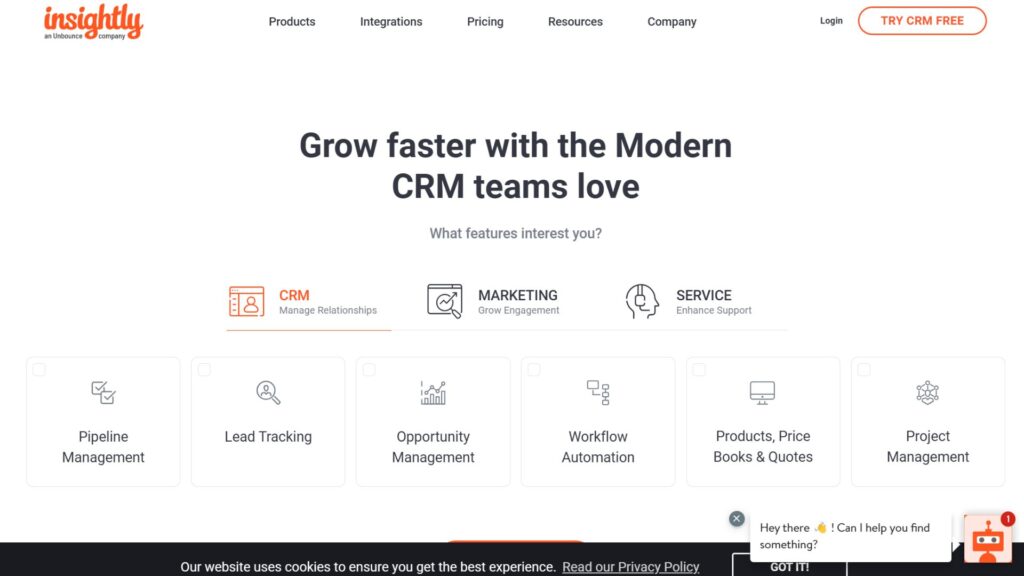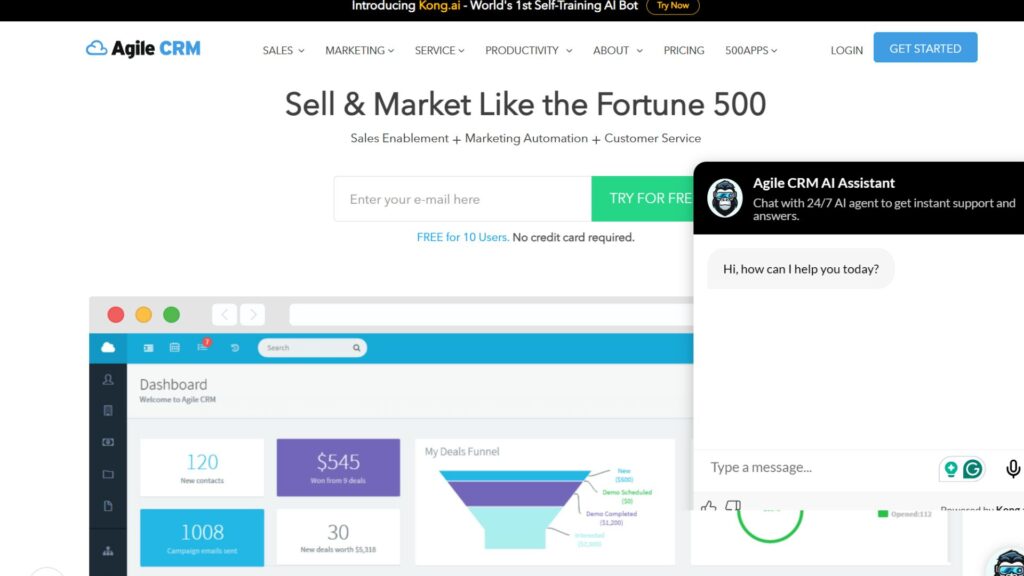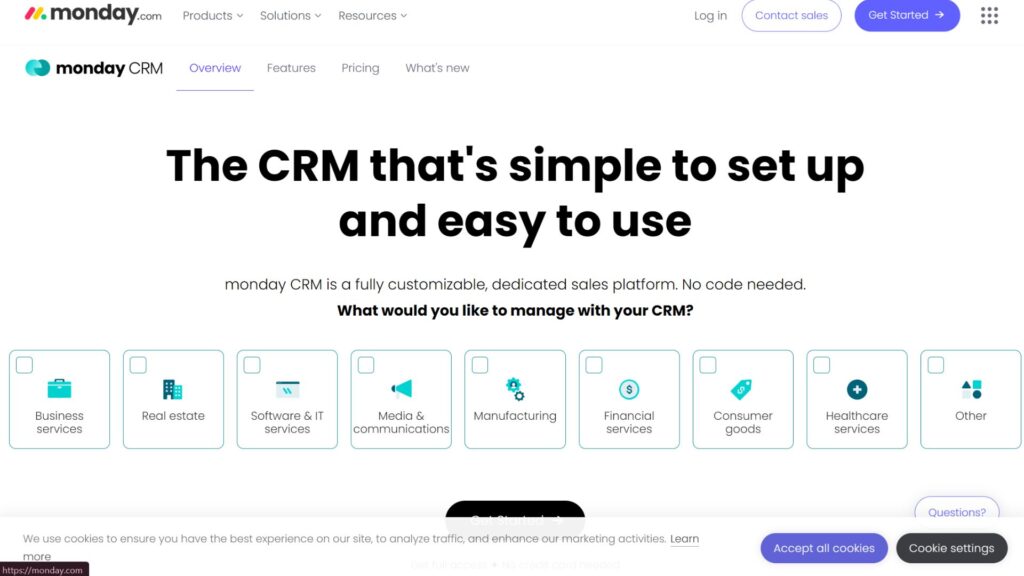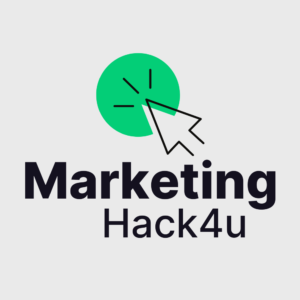In today’s competitive business environment, where the pace of change is continually increasing, CRM has emerged as a critical success factor for organizations that seek to perform and transform.
The best CRM tools are used in handling customers’ communications and identifying their needs, increasing sales, and developing long-term relationships with them.
Being one of the largest and growing markets in the world, India has tremendous opportunities to provide CRM solutions that are suited for different businesses and industries.
That is why we are starting a search for the best CRM software in India that would make your business processes easier, increase customer satisfaction, and maximize your efficiency.
In this blog, you will be given an insight into the best CRM software solutions in India that have been chosen after analyzing the software according to their functionality capacity, ease of use, customer feedback, and efficiency.
Regardless of whether you are a small business or a large enterprise, this article will help each reader make a wise decision on which CRM application is most suitable and affordable for your company.
What is CRM software?
Customer Relationship Management (CRM) is a technology employed by firms to facilitate their transaction relationship with their marketers and customers. Customer relationship management assumes and categorizes information about customers and seeks to enhance business relationships, efficiency, and profitability.
Core Functions of CRM Software:
- Contact Management: Saves and categorizes customer information such as name, phone number, and communication records.
- Sales Management: Assists in the management and follow-through in the sales funnel, which ranges from lead acquisition to closure.
- Customer Support: Offers a way of coping with customers’ requests, support tickets, and service requests.
- Marketing Automation: Simplifies all marketing-related activities, including the distribution of emails, management of leads, and social media marketing, among others.
- Data Analysis and Reporting: Gives tips through the use of analytics and reports to help in strategic management in an organization.
Importance of CRM software
Enhanced Customer Relationships
CRM systems help a company organize contacts with buyers and study them. Combined customer information helps better segment customers, create individual messages, and provide relevant offers, which will also help in the development of long-term relationships.
Improved Efficiency
CRM software relieves the user of monotonous jobs such as data input and follow-up on clients. This saves time for the employees to concentrate on other important aspects of the organization and hence reduces the rate of making errors.
Data-Driven Decision Making
An added advantage of most CRM systems is their analyses and presentation capabilities to give details on consumers, selling, and marketing strategies. It enables the formation of better decisions and strategies among business establishments.
Increased Sales and Revenue
Sales processes are made efficient through leads and pipelines, as well as through various automation tools that CRM offers. The general idea that can be derived from this is that if businesses apply good practices in managing and cultivating leads, then they can sail through the sales process and, therefore, gain more revenue.
Importance of choosing the right CRM for businesses?
Alignment with Business Needs
Taken together, it means that choosing a CRM system that meets one’s business objectives and requirements will help to leverage the system. A CRM needs to be customized to fit the needs of your business and the nature of your business’s operations.
Scalability and Flexibility
Depending on the level of the business you engage in, the CRM requirements can change. A suitable CRM must be elastic, which would enable the addition of users, integration of new CRM tools, and accommodating the growing needs for change.
User Adoption and Satisfaction
Intuitive CRM solutions prompt a greater level of usage among employees. Another reason why managers should implement interventions that are easy to navigate and provide benefits is that the interventions will then be used properly by the employees, which will lead to better productivity and satisfaction.
Cost Efficiency
It is, therefore, important to invest in a CRM solution that gives the most value for the cash. It is important to assess the cost, functionalities, and ROI before implementing a CRM so that the company does not spend excessively and the CRM tool fits the company’s needs.
Key Features to Look for in CRM Software
Contact and Lead Management
When selecting a CRM solution, pay particular attention to such features as contact/lead management. It should also provide tracking of interactions made with the leads, categorizing the leads where necessary, and efficient follow-up should also be captured when developing the features.
Sales automation
Sales automation tools support the leading role of the salesperson and bring benefits using automated leads scoring, follow-up alerts, and e-mail correspondence. This ensures that every sale and other related activities are responded to on time so that sales can be effectively managed.
Customer support and Service Communication Equipment
Opt for a CRM that includes customer support features such as tickets, chat, and a base of knowledge. These tools are also very important in minimizing and handling customers’ complaints in the best manner ever.
Reporting and Analytics
CRM software should contain vast reporting and analytics capabilities. These aspects help to identify business trends about outcomes from sales, customer behaviour patterns, and campaign performance, thus making it easier to make informed decisions.
Integration Capabilities
Make sure that your chosen CRM can be easily connected with other software and applications your company employs, like email service providers, marketing platforms, ERP solutions, and more. This integration helps eliminate redundancies and improve workflow and data processing in organizations.
Mobile Access
An added feature is the capability to have a mobile CRM where customers and sales can be worked on even on a mobile device. This flexibility is especially useful for firms that have teleworkers or those organizations with a workforce that is located in the field.
Customization Options
Customization features allow you to configure the CRM solution to work with your organization’s exact business processes and requirements. Consider the ability to change the fields, workflows, or the overall layout and appearance of dashboards as per requirement.
List of 15 Best CRM Software in India
1. Salesforce

Salesforce can be considered as one of the most reputable CRM suppliers with the tool being highly customizable to address the requirements of various organizations. This includes; sales automation, customer care management, and rich analytical tools among others. Institutions get to leverage Salesforce by integrating it with a multitude of third-party applications which breaths its functionalities to meet different needs.
Due to these features, it can be highly pertinent specifically for large-scale companies that need customized plans and complex reporting. The salesforce’s various integrated and elaborate tools help business organizations in handling various types of customer relations and organizational procedures.
Key Features
- Sales Cloud
- Marketing Cloud
- Service Cloud
- Einstein Analytics
- AppExchange
Pros
- Highly customizable
- Extensive features
- Strong integration
Cons
- Expensive, especially for advanced features
- Steep learning curve
Best Suited For
Large enterprises and organizations require a comprehensive and customizable CRM solution.
Pricing
- Sales Cloud: Starting at ₹2,100/user/month
- Marketing Cloud: Custom pricing
- Service Cloud: Starting at ₹5,300/user/month
Website: www.salesforce.com
2. HubSpot CRM

HubSpot CRM is renowned for its user-friendly design and effectiveness in managing customer relationships. Its free basic version provides essential CRM tools ideal for small businesses and startups. As companies expand, HubSpot offers scalable paid plans with advanced features for sales automation, marketing, and customer service.
The platform’s seamless integration with HubSpot’s marketing and sales tools ensures that all aspects of customer engagement are managed cohesively. HubSpot CRM’s focus on ease of use and powerful capabilities makes it a favored choice for businesses looking to enhance their customer interactions without a steep learning curve.
Key Features
- Contact Management
- Sales Pipeline Management
- Email Tracking
- Reporting and Analytics
- Integration
Pros
- the free basic version is available
- Easy-to-use interface
- Strong marketing tool integration
Cons
- Advanced features come with higher plans
- Can become expensive when additional features are added
Best Suited For
Small to medium-sized businesses need an easy-to-use CRM with strong marketing integration.
Pricing
- Free Plan: Basic features
- Paid Plans: Starting at ₹3,700/user/month
Website: www.hubspot.com/products/crm
3. Zoho CRM

It is the best CRM software in India. Zoho CRM tool is known for its great level of flexibility and numerous features that allow it to become a great pick for companies of different sizes. This includes solutions for sales automation, marketing management, options for customer analysis, and much more.
Zoho has a simple interface, and it can connect with many other tools, making it easy to customize according to company needs and improve the organizational processes significantly. Further, it is affordable, which means that startups may adopt it, while powerful corporations may scale it up when they expand.
Key Features
- Sales Automation
- Marketing Automation
- AI-Powered Insights
- Customizable Dashboards
- Integration
Pros
- Easy to afford
- Highly customizable
- Extensive integrations
Cons
- Complex user interface
- Performance issues reported occasionally
Best Suited For
Small to medium-sized businesses looking for a flexible and cost-effective CRM solution.
Pricing
- Standard Plan: Starting at ₹1,170/user/month
- Professional Plan: Starting at ₹1,870/user/month
- Enterprise Plan: Starting at ₹3,200/user/month
Website: www.zoho.com/en-in/crm
4. Microsoft Dynamics 365

Microsoft Dynamics 365 solutions provides a comprehensive suite of CRM and ERP functionalities designed to deliver a unified experience for managing business operations. It includes tools for sales, customer service, and marketing, integrated with other Microsoft products such as Office 365 and LinkedIn.
Dynamics 365’s advanced analytics and automation capabilities enable businesses to gain actionable insights and optimize their processes. The platform’s flexibility and extensive customization options make it suitable for large organizations with complex requirements.
Dynamics 365’s seamless integration with Microsoft’s ecosystem enhances productivity and provides a cohesive solution for managing various business functions.
Key Features
- Sales: Sales automation, opportunity management, and customer insights.
- Marketing: Campaign management, marketing automation, and lead management.
- Customer Service: Case management, service scheduling, and support analytics.
- AI and Analytics: Advanced data analytics and predictive insights.
- Integration: Seamless integration with Microsoft Office, Azure, and other Microsoft products.
Pros
- Deep integration with Microsoft products
- Advanced analytics and AI capabilities
- Scalable and customizable
Cons
- Complex setup and configuration
- Higher cost
Best Suited For
Large enterprises and organizations already using Microsoft products are seeking an integrated CRM and ERP solution.
Pricing
- Sales Professional: Starting at ₹5,200/user/month
- Customer Service: Starting at ₹4,150/user/month
Website: www.microsoft.com/en-us/dynamics-365
5. Pipedrive

Pipedrive is designed with a strong emphasis on sales pipeline management, offering a visual and intuitive interface that helps sales teams stay organized and focused. Its key features include pipeline tracking, sales automation, and activity reminders, which assist in managing deals more efficiently.
Pipedrive’s user-friendly design ensures that users can easily navigate through their sales processes and quickly adapt to changes. The platform’s automation features streamline repetitive tasks, allowing sales teams to focus on closing deals and building customer relationships.
Pipedrive’s simplicity and effectiveness make it an excellent choice for businesses prioritizing sales efficiency.
Key Features
- Visual Sales Pipeline: Manage and visualize deals through customizable stages.
- Deal Tracking: Track deal progress and activities.
- Email Integration: Email tracking, templates, and automation.
- Sales Reporting: Performance metrics, forecasts, and reports.
- Activity Reminders: Schedule and track follow-up activities.
Pros
- Easy to use with a visual interface
- Effective sales pipeline management
- Affordable for small to medium-sized teams
Cons
- Limited features beyond sales management
- Not as customizable as other CRMs
Best Suited For
Sales teams need a straightforward CRM solution with a focus on pipeline management.
Pricing
- Essential Plan: Starting at ₹1,240/user/month
- Advanced Plan: Starting at ₹2,440/user/month
Website: www.pipedrive.com
6. Freshsales

Freshsales, part of the Freshworks suite, is known for its simplicity and powerful features aimed at enhancing sales productivity. It offers tools such as lead scoring, email tracking, and AI-driven insights that help businesses understand customer behaviour and optimize their sales strategies.
Freshsales’ intuitive interface and integration with other Freshworks products, such as Freshdesk for customer support and Freshmarketer for marketing automation, ensure a cohesive experience across all business functions. This integration enhances overall operational efficiency and provides a unified view of customer interactions.
Key Features
- Sales Automation: Automate repetitive tasks and sales processes.
- Email Tracking: Monitor email interactions and open rates.
- AI Lead Scoring: Use AI to prioritize and score leads.
- Reporting and Analytics: Track sales performance and generate reports.
- Integration: Integrates with Freshworks suite and other third-party applications.
Pros
- User-friendly interface
- AI-driven lead scoring
- Strong customer support
Cons
- Limited customization options
- Fewer integrations compared to competitors
Best Suited For
Businesses seeking a CRM with strong sales automation and AI features.
Pricing
- Free Plan: Basic features
- Growth Plan: Starting at ₹1,230/user/month
- Pro Plan: Starting at ₹3,210/user/month
Website: www.freshworks.com/crm/sales/
7. Insightly

Insightly offers a robust CRM solution that combines customer relationship management with project management features. This integration allows businesses to manage leads, track projects, and maintain customer relationships from a single platform.
Key features include sales automation, task management software, and customizable dashboards. Insightly’s ability to provide a holistic view of both customer interactions and project progress makes it a valuable tool for businesses that require both CRM and project management capabilities.
Its user-friendly interface and strong integration options ensure that teams can work efficiently and stay organized.
Key Features
- Contact and Lead Management: Manage customer information and track interactions.
- Sales Automation: Automate sales processes and manage opportunities.
- Project Management: Track and manage projects, tasks, and milestones.
- Email Tracking: Monitor email communications and interactions.
- Custom Dashboards: Create and customize dashboards and reports.
Pros
- Combines CRM and project management software
- Customizable and flexible
- Good for project-based businesses
Cons
- It can be complex to set up
- Performance issues reported
Best Suited For
Businesses that need both CRM and project management functionalities.
Pricing
- Plus Plan: Starting at ₹2,370/user/month
- Professional Plan: Starting at ₹4,090/user/month
Website: www.insightly.com
8. Nimble

Nimble is a social CRM platforms that focuses on building and nurturing customer relationships through social media integration. It offers features such as contact management, sales pipeline tracking, and social media engagement tools.
Nimble’s ability to integrate with social networks and provide insights from social interactions makes it a valuable tool for businesses looking to leverage social media for customer engagement. Its user-friendly interface and emphasis on social CRM help companies build stronger connections with their customers and enhance their overall engagement strategies.
Key Features
- Social Media Integration: Connect and manage social media profiles.
- Contact Management: Organize and track customer interactions.
- Email Tracking: Monitor email engagement and interactions.
- Sales Pipeline Management: Track and manage sales deals.
- Relationship Insights: Gain insights into customer interactions and engagement.
Pros
- Strong social media integration
- Affordable pricing
- Easy to use
Cons
- Limited advanced CRM features
- Less suitable for larger organizations
Best Suited For
Small businesses and professionals are focusing on social media and relationship management.
Pricing
- Business Plan: Starting at ₹1,580/user/month
Website: www.nimble.com
9. SugarCRM

Sage CRM is designed to help businesses enhance their customer relationships and drive sales growth with a range of comprehensive features. It includes tools for sales automation, marketing management, and customer support, all within a flexible and customizable platform.
Sage CRM’s integration capabilities allow businesses to connect with various third-party applications, extending its functionality to meet specific needs. Its focus on providing a unified view of customer interactions helps companies streamline their operations and improve decision-making.
Sage CRM tool is suitable for a wide range of industries and business sizes, offering solutions that adapt to diverse requirements.
Key Features
- Sales Automation: Manage leads, opportunities, and sales processes.
- Marketing Automation: Run marketing campaigns and track their effectiveness.
- Customer Support: Case management and support tools.
- Custom Workflows: Create and manage custom workflows and processes.
- Analytics: Advanced reporting and analytics capabilities.
Pros
- Highly customizable
- Open-source options available
- Comprehensive feature set
Cons
- It can be complex to configure
- Higher cost for advanced features
Best Suited For
Businesses need a highly customizable CRM with advanced capabilities.
Pricing
- Sugar Professional: Starting at ₹5,200/user/month
- Sugar Enterprise: Starting at ₹12,500/user/month
Website: www.sugarcrm.com
Suggested Read– Email Marketing Tools
10. Close

Close is a CRM designed with a strong focus on sales teams, providing tools to improve sales productivity and manage customer relationships effectively. It features robust communication tools, such as integrated calling and email tracking, that streamline the sales process.
Close’s advanced reporting and analytics help sales teams track performance and optimize strategies. Its intuitive interface and automation capabilities make it a powerful tool for managing leads and closing deals, making it especially suitable for businesses with a strong emphasis on sales efficiency.
Key Features
- Built-In Calling: Integrated calling features for direct communication with leads.
- Email Automation: Automated email sequences and tracking.
- Sales Reporting: Performance metrics, sales forecasting, and custom reports.
- Pipeline Management: Visualize and manage sales pipelines and deals.
- CRM Analytics: Track and analyze sales performance and activities.
Pros
- Integrated communication tools
- Focused on sales productivity
- Good for remote teams
Cons
- Limited features outside of sales
- Higher cost
Best Suited For
Sales teams need an integrated communication and CRM solution.
Pricing
- Starter Plan: Starting at ₹2,370/user/month
- Professional Plan: Starting at ₹8,190/user/month
Website: www.close.com
11. Keap

Keap, formerly known as Infusionsoft, offers a CRM solution that combines sales and marketing automation with customer relationship management. It provides lead generation tools, sales pipeline management, and email marketing.
Keap’s automation features help businesses streamline repetitive tasks and nurture leads effectively. Its user-friendly design and integration with various third-party applications make it a valuable tool for small to medium-sized businesses looking to automate their sales and marketing processes.
Key Features
- Contact Management: Organize and manage customer information.
- Marketing Automation: Create and automate marketing campaigns and email sequences.
- Sales Pipeline Management: Track sales opportunities and deals.
- Reporting and Analytics: Performance tracking and custom reports.
- Lead Management: Capture and nurture leads effectively.
Pros
- Integrated CRM and marketing automation
- User-friendly interface
- Good for small businesses
Cons
- Higher cost compared to some competitors
- Limited features for larger businesses
Best Suited For
Small businesses need a CRM with strong marketing automation capabilities.
Pricing
- Lite Plan: Starting at ₹10,700/month
- Pro Plan: Starting at ₹16,400/month
Website: www.keap.com
12. Agile CRM

Agile CRM offers a range of features designed to streamline sales, marketing, and customer service processes. Its tools include sales automation, marketing automation, and customer support management, all within an easy-to-use interface.
Agile CRM is known for its affordability and flexibility, making it a great option for small to medium-sized businesses. It also provides integration with various third-party applications, allowing companies to enhance its functionality as needed.
Agile CRM’s focus on simplicity and cost-effectiveness makes it an appealing choice for businesses looking to manage their customer relationships without complex systems or high costs.
Key Features
- Contact Management: Manage customer data and interactions.
- Sales Automation: Automate sales processes and manage leads.
- Marketing Automation: Email campaigns, social media tools, and workflow automation.
- Customer Service Tools: Ticketing system and helpdesk features.
- Reporting: Basic reporting and analytics.
Pros
- Affordable pricing
- Easy to use and set up
- Good core CRM features
Cons
- Limited advanced features
- Less suitable for larger enterprises
Best Suited For
Small businesses and startups need a simple, cost-effective CRM solution.
Pricing
- Free Plan: Basic features
- Starter Plan: Starting at ₹740/user/month
- Regular Plan: Starting at ₹2,400/user/month
Website: www.agilecrm.com
13. Bigin by Zoho CRM

Bigin by Zoho CRM is designed specifically for small businesses looking for a simple and efficient CRM solution. It offers essential CRM features like sales pipeline management, contact management, and task automation, all within an easy-to-use interface.
Bigin’s focus on simplicity and affordability makes it a great option for businesses that need a straightforward CRM solution without the complexity of more advanced systems. Its integration with Zoho’s suite of products provides additional functionality and scalability as businesses grow.
Key Features
- Sales Pipeline Management: Manage deals and sales processes.
- Contact Management: Organize and track customer interactions.
- Workflow Automation: Automate repetitive tasks and processes.
- Email Integration: Connect and track email communications.
- Reporting: Basic analytics and performance tracking.
Pros
- Simple and affordable
- Easy to use
- Good core CRM functionalities
Cons
- Limited customization options
- Fewer advanced features
Best Suited For
Small businesses are seeking a straightforward, affordable CRM solution.
Pricing
- Personal Plan: Starting at ₹580/user/month
- Professional Plan: Starting at ₹960/user/month
Website: www.bigin.com
14. Monday.com

Monday.com CRM integrates CRM functionalities within its broader work operating system. It offers customizable boards for tracking sales pipelines, managing leads, and overseeing customer interactions.
The platform’s visual interface and automation features help teams stay organized and streamline workflows. Monday.com CRM is known for its flexibility and ease of use, allowing businesses to tailor the system to their specific needs.
Its integration with other Monday.com tools provides a cohesive experience for managing various aspects of business operations, making it a versatile choice for diverse business requirements.
Key Features
- Visual CRM Management: Customizable pipelines and workflows.
- Project Management Integration: Manage projects and tasks alongside CRM activities.
- Automation: Automate repetitive tasks and workflows.
- Reporting Tools: Customizable dashboards and reporting.
- Integration: Connects with a wide range of apps and services.
Pros
- Highly customizable and visual interface
- Integrates well with project management tools
- Flexible and adaptable
Cons
- CRM features may be less advanced
- It can be costly for smaller teams
Best Suited For
Businesses need a customizable CRM integrated with project management tools.
Pricing
- Basic Plan: Starting at ₹830/user/month
- Standard Plan: Starting at ₹960/user/month
Website: www.monday.com
15. Copper CRM

Copper CRM, formerly known as ProsperWorks, is designed to integrate seamlessly with Google Workspace (formerly G Suite). It provides a CRM solution that leverages Google’s tools, offering features such as contact management, sales pipeline tracking, and workflow automation.
Copper’s deep integration with Google Workspace ensures that users can manage their CRM activities directly within their existing Google environment, streamlining workflows and enhancing productivity. Its focus on seamless integration and ease of use makes it a strong choice for businesses that rely heavily on Google’s suite of applications.
Key Features
- Google Workspace Integration: Syncs with Gmail, Google Calendar, and other Google apps.
- Sales Pipeline Management: Track deals, manage sales processes, and visualize pipelines.
- Email Integration: Directly manage and track emails within the CRM.
- Task and Project Management: Integrates with Google Tasks and other project management tools.
- Reporting and Analytics: Generate reports and track performance metrics.
Pros
- Deep integration with Google Workspace
- Easy to use for Google app users
- Strong sales and pipeline management features
Cons
- Limited to Google Workspace users
- Higher cost compared to some other CRMs
Best Suited For
Businesses that use Google Workspace and need a CRM with tight integration with Google apps.
Pricing
- Basic Plan: Starting at ₹3,700/user/month
- Professional Plan: Starting at ₹7,400/user/month
Website: www.copper.com
How to Choose the Right CRM for Your Business
Assess Your Business Needs
An important aspect of choosing the right software is to consider the particular requirements of your business, such as contact management, sales management, or customer service. Select the CRM that fits your outlined requirements and should enable your business processes.
Consider Integration Requirements
Make sure the CRM interacts with other applications that your company implements. This includes email, marketing platforms, and financial systems, among others.
Evaluate Scalability and Flexibility
Select a CRM solution that can expand according to the size of your business. It should allow for expansion of the program as further demands are added, such as the need to accommodate more users or to include more functionalities.
Check User-Friendliness
By making the CRM easy for the employees to use, there is an increased chance that the applications will be embraced and used frequently. Search for ergonomic designs with short learning curves to guarantee optimal use of the selected tools.
Compare Pricing and Features
It is appropriate to assess the cost of various CRM systems available and compare them with one another’s offerings. Make sure that the CRM offers a great input-output ratio and that you can afford it.
Review Customer Support
Evaluating customers’ complaints and satisfaction received much attention since it is essential for problem-solving and efficiency of the CRM system. Find out the kind of support they offer, including chat support, helpline support, and online support.
Conclusion
CRM is the most strategic system that can be deployed in an organization to support its sales force and manage its customer relations, so selecting the right CRM software package is very crucial.
Thus, by knowing what CRM software is, why it is important, and how one can go about choosing the best option for one’s business, one can make an informed decision that will improve productivity and, hence, increase sales.
This article covers the best CRM software for 2024 and will help businesses select according to the various needs and options provided by the CRM software and the different prices. Compare all the CRM to your needs and choose one that meets your goals and budget and is manageable.
Frequently Asked Questions (FAQs)
1. What is the most important advantage of using CRM software?
CRM stands for customer relationship management, and the Best CRM software is used by organizations to keep track and sort through Customer Relations, hence improving customer relations and making better decisions much faster.
2. How does CRM software work to increase sales leads?
CRM tools in selling make it easier for sales personnel to manage leads and sales pipelines, as well as automate the various sales processes to increase sales revenue.
3. Is it possible to adjust CRM to the specifics of a particular commercial enterprise?
Indeed, the majority of CRM systems available in the market today come with customization possibilities that enable companies to adapt the software to the organization’s processes and needs.
4. What should I keep in mind when I am evaluating CRM pricing?
When evaluating CRM pricing, consider the features offered, scalability, integration capabilities, and the potential return on investment. Ensure that the best CRM software meets your business needs without overspending.

